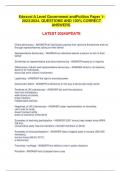Edexcel A Level Government and Politics Paper 1- 2023/2024. QUESTIONS AND 100% CORRECT ANSWERS . LATEST 2024UPDATE Direct democracy - ANSWER -all individuals express their opinions themselves and not through representatives acting on their behalf Representative democracy - ANSWER -an individual selects a person to act on their behalf Similarities of representative and direct democracy - ANSWER -based on a majority Differences of direct and representative democracy - ANSWER -direct is not elective, direct is for individuals, direct has more citizen involvement Legitimacy - ANSWER -the right to exercise power Democratic deficit - ANSWER -a deficiency in the way a democratic body works Positives of UK's democracy - ANSWER -fair and free elections, free from intimidation, wide choice of parties, press freedom, independant judiciary Negatives of UK's democracy - ANSWER -under representation of minorities, can't vote for lords, doesn't protect rights press is owned by millionaires Examples of declining participation - ANSWER -2001 turnout was lowest since WWII (59.4%), conservative party has lost members (124,000 members in 2018) Examples of rising participation - ANSWER -labour biggest party in europe (552,000 members), turnout rising (68.6% 2017), e-democracy Franchise / suffrage - ANSWER -the ability to vote in public elections Pluralism - ANSWER -lots of people have a say Elitism - ANSWER -only a select few have a say To be able to vote you must: - ANSWER -be 18+, be a registered british/irish citizen To be able to vote you cannot: - ANSWER -be under 18, be a member of the house of lords, be convicted of illegal electoral practise, detained in a psychiatric hospital Great reform act 1832 - ANSWER -created 67 new constituencies, included small land owners, tenant farmers and shopkeepers in the property qualification and gave the vote to all householders who paid a yearly rent of £10+ Representation of the people act 1918 - ANSWER -allowed men 21+ (with/without property) and women 30+ who live in the constituency or owned land worth £5+ to vote Representation of the people act 1928 - ANSWER -gave women electoral equality (21+ with/without property) Representation of the people act 1948 - ANSWER -abolished plural voting (2 separate uni votes) and increased MP's to 613 Representation of the people act 1969 - ANSWER -voting age reduced to 18 to reflect change in view on adulthood For lowering voting age to 16: - ANSWER -already trusted with legal rights (leave school, work, army), have to learn about politics in school, voting earlier increases chance of involvement, affects their future Against lowering voting age to 16: - ANSWER -some lack maturity, may be influenced by parents, scottish referendum isn't fair because it had an unusually high turnout, only a few countries allow 16 year olds to vote Electoral Reform Society - ANSWER -longest standing pro democracy organization (1884), formed to provide better democracy where everyone votes and is treated equally, works with activists and politic ians Electoral reform society campaigns - ANSWER -elected house of lords, votes at 16, local democracy, replace FPTP with STV Votes at 16 - ANSWER -formed in january 2003, want the voting age lowered to 16 as it affects young people's future Pressure group - ANSWER -an organised group that seeks to influence government policy or legislation Pluralism - ANSWER -the recognition and affirmation of diversity within a political body which permits the peaceful coexistence of different interests, convictions and lifestyles Pressure group features: - ANSWER -want to influence policy, usually single issue, more of them, represent an issue that isn't supported by the wider public Political parties features: - ANSWER -want to make policy and run the country, aim to win power, few parties, have a wide range of policies to accommodate a wide range of views, create laws Sectional pressure groups - ANSWER -a specific group that promotes the interest of an occupation or group in society Sectional pressure group examples - ANSWER -trade unions, national union of teachers, british medical association Cause pressure groups - ANSWER -aims to change opinions and attitudes, open to everyone Cause pressure groups examples - ANSWER -greenpeace, PDSA, RSPCA Sectional cause pressure groups - ANSWER -the membership are different to the group it represents Sectional cause pressure groups examples - ANSWER -NSPCC, WWF Attitude cause pressure groups - ANSWER -aims to change the public's attitude towards an issue Attitude cause pressure groups examples - ANSWER -greenpeace, campaign for nuclear disarmament Political cause pressure groups - ANSWER -aim to get legislation created or changed Political cause pressure groups examples - ANSWER -electoral reform society, 3 8 degrees




